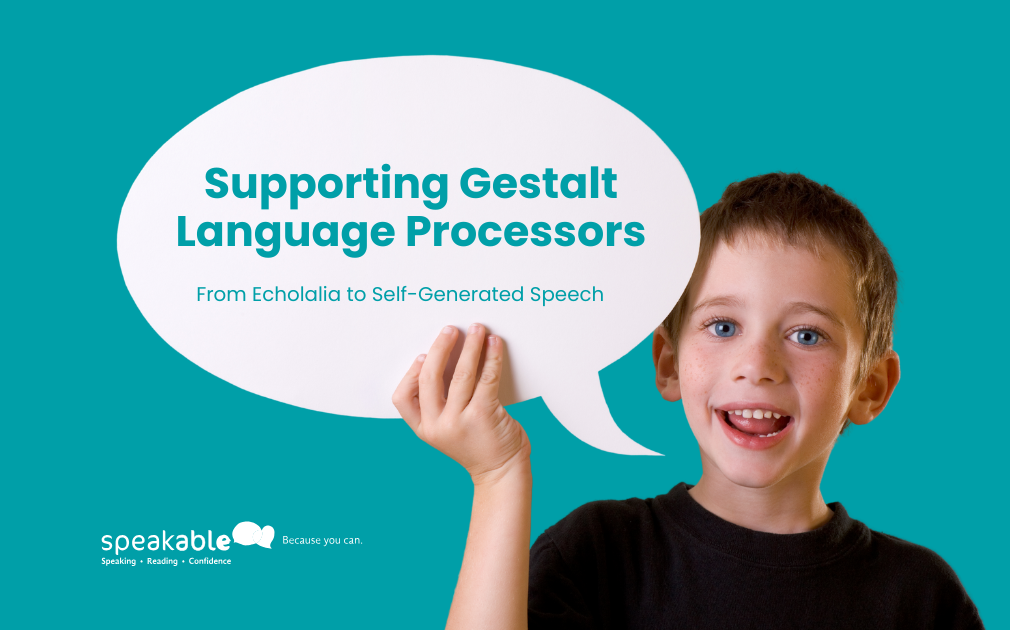Supporting Gestalt Language Processors: From Echolalia to Self-Generated Speech
When your child repeats phrases over and over, it’s not just “parroting” — it might be the beginning of real communication.
What is Gestalt Language Processing?
Every child learns language differently. While many children learn to speak by putting together single words (“ball”, “go”, “mummy”), others learn in larger chunks or phrases. This style is called Gestalt Language Processing (GLP).
Children who are gestalt processors might start with memorised phrases — like “Let’s go!” or “Do you want a snack?” — often copying tone and rhythm exactly. These chunks of language, called gestalts, are meaningful to the child, even if they aren’t using each word independently yet.
This is different from the more common “analytic” language path, where children build language from single words upward. Neither style is better — just different. But understanding how your child processes language helps you support them more effectively.
Echolalia: A Key Step in Language Growth
Echolalia means repeating words or phrases heard from others. It’s often one of the first signs of gestalt processing. While it may seem random or out of place, echolalia is a functional and important part of language development for GLP children.
There are two main types:
- Immediate echolalia: repeating something just heard.
- Delayed echolalia: repeating something heard earlier — maybe from a parent, teacher, or even a TV show.
For example, your child might say “It’s time to clean up!” when they actually mean “I’m ready to finish playing,” because they heard that phrase at preschool during tidy-up time. The script holds emotional meaning, even if it’s not a literal request.
Instead of trying to stop echolalia, we should listen closely, validate it, and help children move forward to more flexible language.
Stages of Gestalt Language Development
Gestalt language processors typically move through 4 main stages:
- Whole scripts: The child uses full phrases heard from others.
- Modified scripts: They begin to trim or mix scripts to create new phrases.
- Single words and simple combinations: They use words more independently, like “want juice”.
- Original phrases with simple grammar: They form their own sentences like “I go home now”.
Children move through these stages at their own pace — and that’s okay.
How Parents Can Support Gestalt Language Development
1. Treat echolalia as communication
Respond with interest and warmth, even if the phrase isn’t fully clear. That helps your child feel heard and keeps the door open for more interaction.
2. Be a communication detective
Notice when and where your child uses certain phrases. Often, their scripts carry real meaning. Reflect it back and model a new way to say it when they’re ready.
3. Model short, natural phrases
Speak in simple phrases your child can hear often and eventually use. Phrases like “Let’s go”, “All done”, or “Want more?” are easy to remember and meaningful.
4. Follow their interests
Play alongside them, use their favourite toys, and speak in context. Language connected to what they love is more likely to stick.
5. Limit questions — comment instead
Rather than asking too many questions, talk about what’s happening around you. “You’re stacking blocks — so tall!” gives more usable input than “What are you doing?”
When to Seek Extra Support
It may be time to speak to a speech-language pathologist if:
- Your child is over 3 and mostly uses memorised phrases.
- They seem frustrated trying to express themselves.
- You feel unsure about how to help them progress.
Look for professionals trained in Natural Language Acquisition (NLA) or experienced with gestalt language development. The right support can make a huge difference.
How Speakable Can Help
At Speakable, we understand that every child’s communication journey is unique — and that includes children who are gestalt language processors. Our team is experienced in working with children who learn language through echolalia and scripting, and we use neurodiversity-affirming approaches to support their growth.
Whether you’re just starting to explore GLP or looking for specific strategies to support your child, we’re here to help. We offer:
- Individual speech therapy sessions (online or in-person)
- Parent coaching and practical resources
- Ongoing support tailored to your child’s language stage
Together, we can turn those beautiful borrowed phrases into confident, self-generated speech — one step at a time.
👉 Learn more about our services here or get in touch to see how we can support your family.




